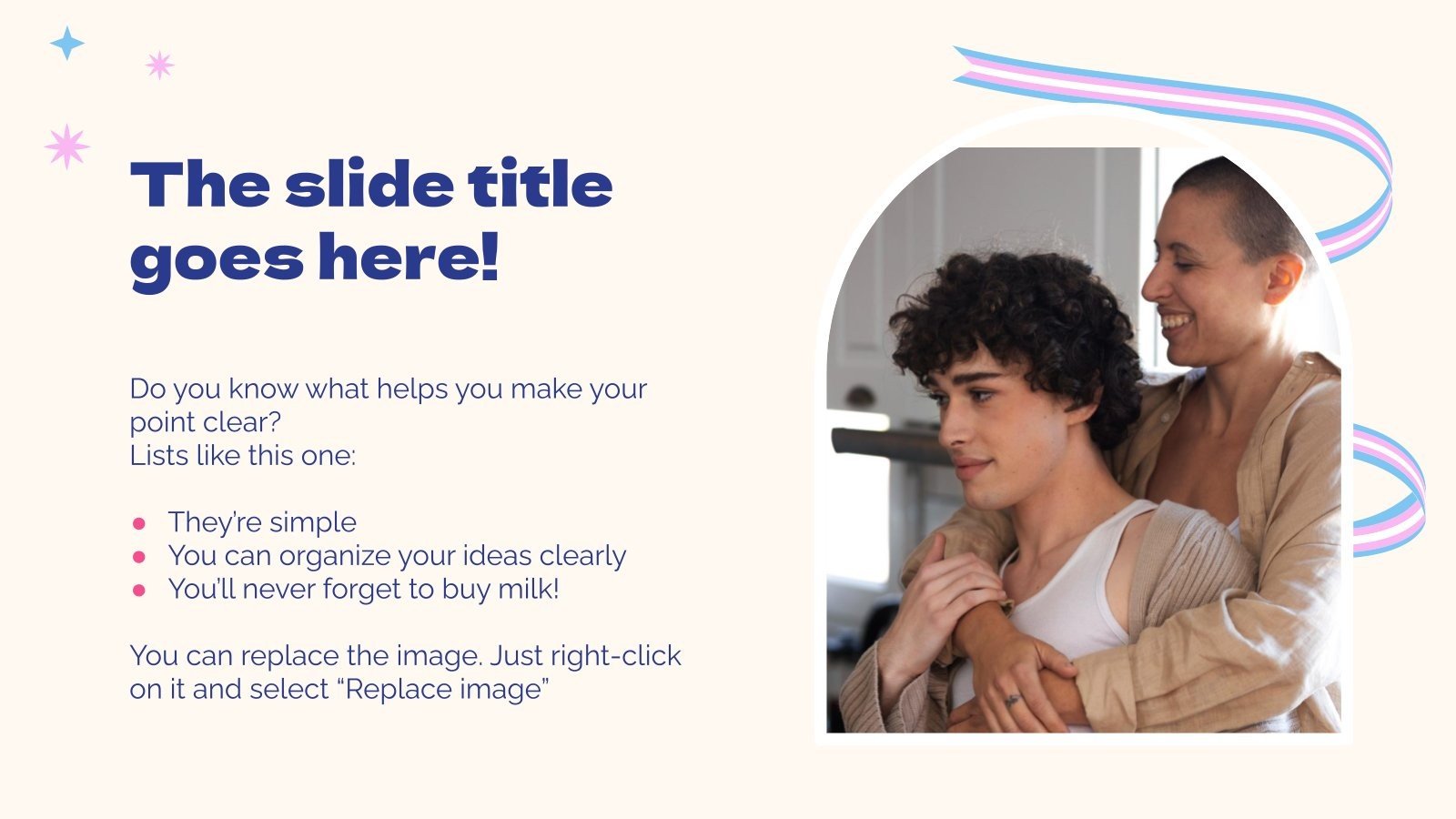How To Be A Better Ally On International Transgender Day Of Visibility

Table of Contents
Educate Yourself on Transgender Issues
Being a better ally starts with education. Understanding the complexities of transgender identities and experiences is crucial for building genuine and respectful relationships.
Understand the Terminology
Knowing the correct terminology is fundamental for respectful communication. Misusing terms can be hurtful and invalidating.
- Sex assigned at birth: This refers to the sex assigned to an individual at birth based on visible anatomical characteristics.
- Gender identity: This is an individual's internal sense of being a man, woman, both, neither, or somewhere else along the gender spectrum. It's how someone feels internally about their gender.
- Gender expression: This refers to how someone outwardly presents their gender through clothing, behavior, and other outward expressions. This can align with or differ from someone's gender identity.
It's vital to use people's preferred pronouns and names. Always ask politely if you're unsure. Resources like GLAAD and The Trevor Project offer excellent guides on inclusive language.
Learn About the Transgender Experience
Understanding the challenges faced by transgender individuals goes beyond terminology. It involves acknowledging the systemic discrimination, violence, and lack of access to healthcare they often encounter.
- Discrimination: Transgender people face discrimination in employment, housing, healthcare, and many other areas of life.
- Violence: Transgender women of color, in particular, are disproportionately affected by violence and hate crimes.
- Healthcare access: Access to gender-affirming care, including hormone therapy and surgery, is often limited or unaffordable.
Listening to transgender voices and perspectives is paramount. Seek out articles, documentaries, and personal stories (with consent) to gain a deeper understanding of their lived experiences.
Debunk Common Misconceptions
Many harmful stereotypes and misconceptions surround transgender people. Challenging these myths is crucial for fostering understanding and acceptance.
- Myth: Transgender identity is a choice. Fact: Gender identity is not a choice; it's an intrinsic aspect of a person's identity.
- Myth: Transgender people are a threat to cisgender people. Fact: Violence against transgender individuals is far more common than violence perpetrated by transgender individuals.
- Myth: Transitioning is solely about physical changes. Fact: Transitioning is a multifaceted process that encompasses social, emotional, and physical aspects.
Combatting misinformation requires providing evidence-based information and challenging harmful stereotypes whenever and wherever they appear.
Actively Support Transgender Individuals
Allyship involves more than just understanding; it requires active support and advocacy.
Advocate for Inclusive Policies
Support legislation and policies that protect transgender rights and ensure equality.
- Non-discrimination laws: Advocate for laws that explicitly protect transgender individuals from discrimination in employment, housing, and public accommodations.
- Access to healthcare: Support policies that ensure access to affordable and comprehensive gender-affirming care.
- Legal recognition: Advocate for legal recognition of gender identity, including the ability to change legal documents to reflect one's affirmed gender.
Contact your elected officials, participate in peaceful protests, and support organizations working to advance transgender rights.
Challenge Transphobia When You See It
Speaking up against transphobic comments, actions, or policies is crucial. This can be challenging, but it's essential for creating a safer and more inclusive environment.
- Direct confrontation: When safe and appropriate, respectfully challenge transphobic remarks. Focus on the impact of their words, not on judging their character.
- Indirect approaches: If direct confrontation is unsafe, consider other approaches, like educating others privately or reporting hate speech.
- Reporting hate crimes: If you witness a hate crime or act of violence, report it to the appropriate authorities.
Remember your safety is paramount. Choose your approach carefully based on the context and your safety.
Support Trans-Owned Businesses and Organizations
Supporting trans-owned businesses and organizations directly contributes to the economic empowerment of the transgender community.
- Online directories: Many online directories list trans-owned businesses.
- Local events: Attend trans-led events and support local trans-owned businesses.
- Word-of-mouth: Spread the word about trans-owned businesses to your networks.
This is a tangible way to demonstrate allyship and contribute to a more inclusive economy.
Be a Better Listener and Supporter
True allyship involves creating space for transgender voices and respecting their experiences.
Listen More Than You Speak
Create a safe and welcoming environment for transgender individuals to share their experiences without judgment.
- Active listening: Pay attention, ask clarifying questions, and show genuine empathy.
- Avoid interrupting: Let them share their experiences at their own pace.
- No unsolicited advice: Unless specifically asked for, avoid giving unsolicited advice.
Focus on understanding their perspective rather than trying to fix their problems.
Center Trans Voices
Amplify the voices of transgender people and give them a platform to share their stories.
- Social media: Share their content and amplify their messages on social media platforms.
- Events: Attend events organized by and for transgender individuals.
- Engagement: Actively engage with their work and contributions.
Centering trans voices means giving them the space and platform to speak for themselves.
Respect Privacy and Boundaries
Recognize that not all transgender people are comfortable sharing their experiences.
- Consent is key: Never share personal information without explicit consent.
- Respect their boundaries: Respect their choices regarding how much they share.
- Avoid intrusive questions: Refrain from asking intrusive or personal questions.
Respecting privacy and boundaries is a fundamental aspect of allyship.
Conclusion
This International Transgender Day of Visibility, let’s recommit ourselves to being better allies. By educating ourselves, actively supporting the transgender community, and fostering a culture of respect and understanding, we can create a more inclusive and equitable world for everyone. Continue your journey towards becoming a better ally by actively seeking out more resources, engaging in conversations, and consistently advocating for the rights and dignity of transgender individuals. Remember, allyship is an ongoing process, and every step you take, no matter how small, makes a difference. Let's work together to build a future where all transgender individuals are celebrated, respected, and supported.

Featured Posts
-
 Snls Impression Of Harry Styles Leaves Him Devastated
May 10, 2025
Snls Impression Of Harry Styles Leaves Him Devastated
May 10, 2025 -
 Pakistan Economic Crisis Imf Review Of 1 3 Billion Aid Package And Geopolitical Factors
May 10, 2025
Pakistan Economic Crisis Imf Review Of 1 3 Billion Aid Package And Geopolitical Factors
May 10, 2025 -
 Indiana High School Athletic Association Bans Transgender Athletes The Trump Orders Effect
May 10, 2025
Indiana High School Athletic Association Bans Transgender Athletes The Trump Orders Effect
May 10, 2025 -
 Council Approves Rezoning Edmontons Nordic Spa Development Progresses
May 10, 2025
Council Approves Rezoning Edmontons Nordic Spa Development Progresses
May 10, 2025 -
 February 15th Nyt Strands Answers Game 349
May 10, 2025
February 15th Nyt Strands Answers Game 349
May 10, 2025
